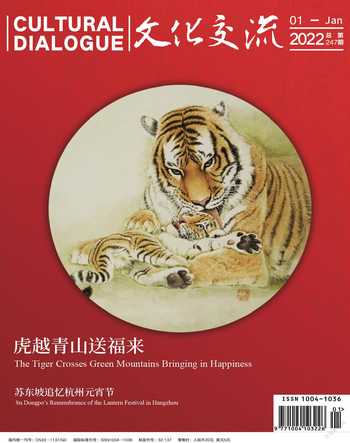Su Dongpo’s Remembrance of the Lantern Festival in Hangzhou
2022-01-22BySimaYimin
By Sima Yimin
In September 1074, Su Dongpo (1037-1101), who was serving as the controller-general (Tongpan or assistant prefect) of Hangzhou, received an edict from the imperial court, appointing him to be the prefect of Mizhou (present-day Zhucheng city, Shandong province). A promotion, of sorts. He took up the post in November of the same year. Soon afterwards, Su was also celebrating the Chinese New Year in Mizhou, and on the fifteenth day of the first lunar month, he wrote the following Ci poem, reminiscing about the Lantern Festival, which falls on that day every year, in Hangzhou.
To the Tune of Die Lian Hua (Butterflies Love Flowers), Lantern Festival in Mizhou
Lamps and lanterns light up the night in Qiantang,The moon shines bright like frost,Illuminating people as if in a painting. Behind the curtains reed pipes are blown and musk perfumes issue forth,Not a speck of dust seen in the wake of horses.
I feel aged in this desolate mountain city, Drums beaten and flutes played, But only for the purpose of farming rites. Fires cold and lights dim under frost and dew, Dark clouds hang over the wilderness, portending snow.
The contrast couldn’t be starker. From the bustling Hangzhou to the much quieter Mizhou, and on the night of the Lantern Festival, it is little wonder that Su Dongpo felt a little nostalgic; after all, he had spent the past three Lantern Festivals in Hangzhou. While staying there, Su also penned a poem titled “Viewing the Lanterns Windingly in the Xiangfu Temple”, in which described the spectacle of the Lantern Festival in the temple: some ladies in long dresses come in the temple holding candles, and others invite guests to drink tea holding silver cups; for days, the revolving lamps in the golden holders give out dazzling light, and the strings of lanterns hang high like ants passing through pearls; lights bobbing up and down are bright as flames and dancing like fish.
The enthusiasm and excitement of the Lantern Festival in Hangzhou, in particular the lantern fairs, are self-evident in this poem. During the Song dynasty (960-1279), unsurprisingly, a large part of the buzz surrounding the Lantern Festival came from “lanterns”. In Wulin Jiushi, or Ancient Matters from the Wulin Garden, a book on Lin’an (present-day Hangzhou), capital of the Southern Song (1127-1279), various lantern fairs and related customs had been well documented.
First, lantern fairs in the imperial palace. “Once in the first lunar month of the year, the numbers of lanterns and lamps grew by the day … with novel ideas every year. … The finest lanterns were the so-called ‘Su Lanterns’ [as they were made in Suzhou city], and the largest ones were a meter or more in diameter, all made of full-color liuli [ancient Chinese glass or crystal] with landscape, figures, plants and animals printed … A liuli lantern hill about 17 meters high was once built …The corridors … and the main imperial hall were festooned with all kinds of liuli lanterns … as if the heavenly palace had descended on earth.”
Then, folk lantern shows were also quite popular. “In the first month of the preceding year, lanterns and lamps were already on sale in what was known as the ‘lantern market’ …”. Apart from the main street, rich families decorated their houses with lanterns and even arranged for singing and dancing performances. In a few temples around the West Lake, some of the best lanterns outside the imperial palace could be found, as “the court would often bestow lanterns upon them”.
Finally, during the Lantern Festival, people wore special outfits for the occasion. The ladies put on up to a dozen accessories on their heads, including pearl and jade ornaments, and neckerchiefs; and “most preferred to be dressed in white, probably because it matches with the moonlight”. They tried different food and snacks for the festival as well. Gluttonous sugar balls (predecessor of today’s gluttonous rice balls), tadpole-shaped rice noodles, fruits from all over the country … you name it, all of which could be bought along the main street, where one could find dancing troupes and performances, too.
With such a live atmosphere, how could one not remember Hangzhou’s Lantern Festival? Is it any surprise then that Su Dongpo chose to indulge a bit in reminiscence?
